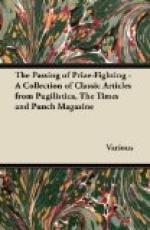We are afraid our prototype is no favourite with the ladies. PUNCH is (and we reluctantly admit the fact) a Malthusian in principle, and somewhat of a domestic tyrant; for his conduct is at times harsh and ungentlemanly to Mrs. P.
“Eve of a land that still is Paradise,
Italian beauty!”
But as we never look for perfection in human nature, it is too much to expect it in wood. We wish it to be understood that we repudiate such principles and conduct. We have a Judy of our own, and a little Punchininny that commits innumerable improprieties; but we fearlessly aver that we never threw him out of window, nor belaboured the lady with a stick—even of the size allowed by law.
There is one portion of the drama we wish was omitted, for it always saddens us—we allude to the prison scene. PUNCH, it is true, sings in durance, but we hear the ring of the bars mingling with the song. We are advocates for the correction of offenders; but how many generous and kindly beings are there pining within the walls of a prison, whose only crimes are poverty and misfortune! They, too, sing and laugh, and appear jocund, but the heart can ever hear the ring of the bars.
We never looked upon a lark in a cage, and heard him trilling out his music as he sprang upwards to the roof of his prison, but we felt sickened with the sight and sound, as contrasting, in our thought, the free minstrel of the morning, bounding as it were into the blue caverns of the heavens, with the bird to whom the world was circumscribed. May the time soon arrive, when every prison shall be a palace of the mind—when we shall seek to instruct and cease to punish. PUNCH has already advocated education by example. Look at his dog Toby! The instinct of the brute has almost germinated into reason. Man has reason, why not give him intelligence?
We now come to the last great lesson of our motley teacher—the gallows! that accursed tree which has its root in injuries. How clearly PUNCH exposes the fallacy of that dreadful law which authorises the destruction of life! PUNCH sometimes destroys the hangman: and why not? Where is the divine injunction against the shedder of man’s blood to rest? None can answer! To us there is but ONE disposer of life. At other times PUNCH hangs the devil: this is as it should be. Destroy the principle of evil by increasing the means of cultivating the good, and the gallows will then become as much a wonder as it is now a jest.
We shall always play PUNCH, for we consider it best to be merry and wise—
“And laugh at all things, for we
wish to know,
What, after all, are all things but a
show!”—Byron.
As on the stage of PUNCH’s theatre, many characters appear to fill up the interstices of the more important story, so our pages will be interspersed with trifles that have no other object than the moment’s approbation—an end which will never be sought for at the expense of others, beyond the evanescent smile of a harmless satire.




